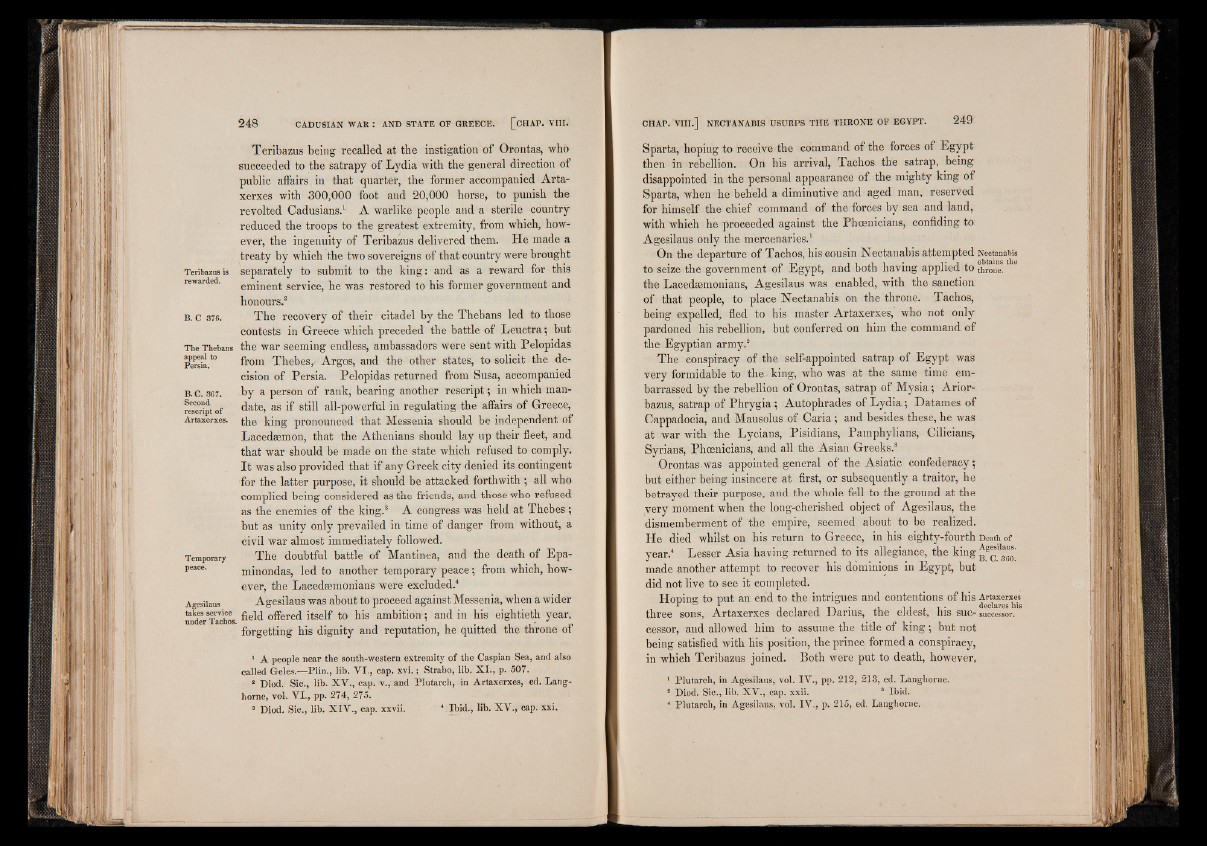
Teribazus being recalled at the instigation of Orontas, who
succeeded to the satrapy of Lydia with the general direction of
public affairs in that quarter, the former accompanied Artaxerxes
with 300,000 foot and 20,000 horse, to punish the
revolted Cadusians.1 A warlike people and a sterile country
reduced the troops to the greatest extremity, from which, however,
the ingenuity of Teribazus delivered them. He made a
treaty by which the two sovereigns of that country were brought
Teribazus is separately to submit to the king: and as a reward for this
rewarded. eminent service, he was restored to his former government and
honours.2
b. c 376. The recovery of their citadel by the Thebans led to those
contests in Greece which preceded the battle of Leuctra; but
The Thebans the war seeming endless, ambassadors were sent with Pelopidas
Persia.*" from Thebes,.- Argos, and the other states, to solicit the decision
of Persia. Pelopidas returned from Susa, accompanied
B. C. 367. by a person of rank, bearing another rescript; in which manrescript
of date, as if still all-powerful in regulating the affairs of Greece,
Artaxerxes. the king pronounced that Messenia should be independent of
Lacedaemon, that the Athenians should lay up their fleet, and
that war should be made on the state which refused to comply.
It was also provided that if any Greek city denied its contingent
for the latter purpose, it should be attacked forthwith ; all who
complied being considered as the friends, and those who refused
as the enemies of the king.3 A congress was held at Thebes ;
but as unity only prevailed in time of danger from without, a
civil war almost immediately followed.
Temporary The doubtful battle of Mantinea, and the death of Epapeaee.
minondas, led to another temporary peace; from which, however,
the Lacedaemonians were excluded.4
Agesihms Agesilaus was about to proceed against Messenia, when a wider
under Ta'chos offered itself to his ambition; and in his eightieth year,
forgetting his dignity and reputation, he quitted the throne of
1 A people near the south-western extremity of the Caspian Sea, and also
called Geles.—Plin., lib. V I., cap. x v i.; Strabo, lib. X I., p. 507.
s Diod. Sic., lib. XV ., cap. v., and Plutarch, in Artaxerxes, ed. Lang-
horne, vol. V I., pp. 274, 275.
3 Diod. Sic., lib. X IV ., cap. xxvii. 4 j Ibid,, lib, XV., cap. xxi.
Sparta, hoping to receive the command of the forces of Egypt
then in rebellion. On his arrival, Tachos the satrap, being
disappointed in the personal appearance of the mighty king of
Sparta, when he beheld a diminutive and aged man, reserved
for himself the chief command of the forces by sea and land,
with which he proceeded against the Phoenicians, confiding to
Agesilaus only the mercenaries,1
On the departure of Tachos, his cousin Nectanabis attempted Nectanabis
to seize the government of Egypt, and both having applied to throne!
the Lacedaemonians, Agesilaus was enabled, with the sanction
of that people, to place Nectanabis on the throne. Tachos,
being expelled, fled to his master Artaxerxes,' who not only
pardoned his rebellion, but conferred on him the command of
the Egyptian army.2
The conspiracy of the self-appointed satrap of Egypt was
very formidable to the, king, who was at the same time embarrassed
by the rebellion of Orontas, satrap of Mysia; Arior-
bazus, satrap of Phrygia; Autophrades of Lydia; Datames of
Cappadocia, and Mausolus of Caria; and besides these, he was
at war with the Lycians, Pisidians, Pamphylians, Cilicians,
Syrians, Phoenicians, and all the Asian Greeks.3
Orontas .was appointed general of the Asiatic confederacy;
but either being insincere at first, or subsequently a traitor, he
betrayed their purpose, and the whole fell to the ground at the
very moment when the long-cherished object of Agesilaus, the
dismemberment of the empire, seemed about to be realized.
He died whilst on his return to Greece, in his eighty-fourth Death of
year.4 Lesser Asia having returned to its allegiance, the king
made another attempt to recover his dominions in Egypt, but
did not live to see it completed.
Hoping to put an end to the intrigues and contentions of his Artaxerxes
three sons, Artaxerxes declared Darius, the eldest, his sue- successor,
cessor, and allowed him to assume the title of king; but not
being satisfied with his position, the prince formed a conspiracy,
in which Teribazus joined. Both were put to death, however,
1 Plutarch, in Agesilaus, vol. IV., pp. 212, 213, ed. Langhorne.
2 Diod. Sic., lib. XV ., cap. xxii. 3 Ibid.
4 Plutarch, in Agesilaus, vol. IV., p. 215, ed. Langhorne.